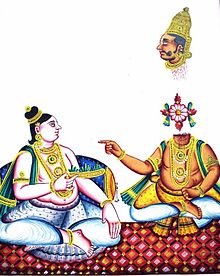Shishupala[1]
-
Name Shishupala Gender Male Ancient Hindu Kingdom Chedi, Ancient Kingdoms, India 
King Association Krishna (Relationship: Slain By) Association Hiranyakashipu (Relationship: Incarnation) Association Ravana (Relationship: Incarnation) Person ID I482 Hindu Puran Genealogy Tree | Somavanshi Last Modified 22 Sep 2013
Father Damaghosha Mother Shrutashrava Family ID F195 Group Sheet | Family Chart
-
Sources
- [S64]
WIKI.Shishupala, Wiki, (Wikipedia), http://en.wikipedia.org/wiki/Shishupala.Shishupala  Krishna slays Shishupala at the Rajasuya Yajña of Yudhishthira
Krishna slays Shishupala at the Rajasuya Yajña of YudhishthiraGenealogy Parents Damaghosha (father), Srutashrava (mother) Siblings Dashagriva, Ramya, Bali, Kushadhysha (brothers), Suprabha, Karenumati (sisters), Krishna (maternal cousin), Dantavakra (maternal cousin) Children Dhrishtaketu, Mahipala, Suketu, Sarabha Shishupala (Sanskrit: शिशुपाल, lit. 'protector of children', IAST: Śiśupāla; sometimes spelt Sisupala) was the king of the Chedi kingdom, and an antagonist in the Mahabharata. He was the son of King Damaghosha and Srutashrava, the sister of Kunti, as well as the cousin of Nanda. He was slain by Krishna, his cousin and an avatar of Vishnu, at the great coronation ceremony of Yudhishthira, as a punishment for his opprobrious abuse made against him. He is also referred to as Chaidya ("King of Chedi"). Shishupala is considered to be the third and last birth of Vishnu's gatekeeper Jaya.[1]
Mahabharata
The Mahabharata states that Shishupala was born with three eyes and four arms. His parents were inclined to cast him out but were warned by a voice from heaven (ākāśavāṇī) not to do so, as his time had not come. It also foretold that his superfluous body parts would disappear when a certain person took the child into his lap and that he would eventually die at the hands of that same person. Coming to visit his cousin, Krishna placed the child on his lap and the extra eye and arms disappeared, thus indicating Shishupala's death was destined at the hands of Krishna. In the Mahabharata, Shishupala's mother Shrutasrava persuaded her nephew, Krishna, that he would pardon his cousin Shishupala for a hundred offences.[2][3]
Rukmi, the prince of Vidarbha, was very close to Shishupala. He wanted his sister Rukmini to marry Shishupala. But before the ceremony could take place, Rukmini chose to elope with Krishna. This made Shishupala hate Krishna. [3]
When Yudhishthira undertook the Rajasuya Yajna, he sent Bhima to obtain the fealty of Shishupala, now king after his father's death. Shishupala accepted Yudhishthira's supremacy with no protest, and was invited to the final ceremony at Indraprastha.
At that event, the Pandavas decided that Krishna would be the special honoured guest of the sacrificial ceremony. This angered Shishupala and he started insulting Krishna, calling him a mere cowherd and worthless to be honoured as a king.[4] He also started insulting Bhishma, calling his vow to remain a celibate throughout life as an act of cowardice. Bhishma became furious and threatened Shishupala, but Krishna calmed him down. Through this act, he committed his 100th sin and was pardoned by Krishna. When he insulted Krishna again, he committed his 101st sin. Krishna then released his Sudarshana Chakra on Shishupala, killing him on the spot.[3] Shishupala's soul was liberated and attained salvation by merging into Krishna's body.
The Shishupala Vadha is a work of classical Sanskrit poetry (kāvya) composed by Māgha in the 7th or 8th century. It is an epic poem consisting of 20 sargas (cantos) of about 1800 highly ornate stanzas[5] and is considered one of the six Sanskrit mahakavyas, or "great epics". It is also known as the Māgha-kāvya after its author. Like other kavyas, it is admired more for its exquisite descriptions and lyrical quality than for any dramatic development of the plot[citation needed]. His sons were killed in the Kurukshetra War [citation needed].
Part of a series on Hindu mythology 
Sources Cosmology Deities Personalities of the Epics Hinduism Portal See also
References
- ↑ Gopal, Madan (1990). K.S. Gautam (ed.). India through the ages. Publication Division, Ministry of Information and Broadcasting, Government of India. p. 80.
- ↑
 This article incorporates text from this source, which is in the public domain: Dowson, John (1879). A Classical Dictionary of Hindu Mythology and Religion, Geography, History and Literature. London: Trubner & Co., Ludgate Hill. p. 294. Retrieved 19 September 2021.
This article incorporates text from this source, which is in the public domain: Dowson, John (1879). A Classical Dictionary of Hindu Mythology and Religion, Geography, History and Literature. London: Trubner & Co., Ludgate Hill. p. 294. Retrieved 19 September 2021. - 1 2 3 Chakravarti 2007.
- ↑ www.wisdomlib.org (9 January 2015). "Shishupala's Liberation [Chapter 6]". www.wisdomlib.org. Retrieved 1 June 2019.
- ↑ S. S. Shashi (1996), Encyclopaedia Indica: India, Pakistan, Bangladesh, Anmol Publications PVT. LTD., p. 160, ISBN 978-81-7041-859-7[permanent dead link]
- Chakravarti, Bishnupada (13 November 2007). Penguin Companion to the Mahabharata. Penguin UK. ISBN 978-93-5214-170-8.
External links
- . New International Encyclopedia. 1905.
This information is sourced from Wikipedia, the leading online open-content collaborative (crowd-sourced) encyclopedia. Wikipedia and/or TransLiteral Foundations can not guarantee the validaity of content above and can not be held responsible for inaccuracies or libelious information within. Please see Wikipedia General Disclaimer.
- [S64]





Comments | अभिप्राय
Comments written here will be public after appropriate moderation.Like us on Facebook to send us a private message.